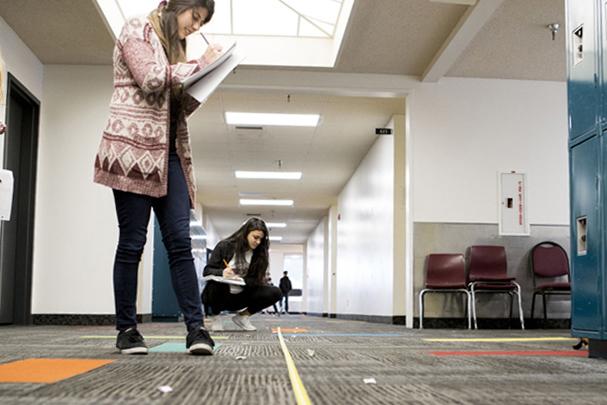Science teacher presents opportunities for lab engagement

Physical science offers a platform for students to learn about physics and chemistry. It gives lessons on the physical side of things, allowing high schoolers to participate in experiments and projects. This differs from life sciences such as biology and zoology.
Fresno Christian offers six different science classes for high schoolers. Split between two different teachers, Scott Bucher and Dr. Karen Walters, each instructor takes on three of these classes. One of the science departments Bucher teaches is physical science.
For one of his lessons, Bucher runs a hands-on lab experiment to help students comprehend their current unit on motion.
During the lab, the class learns how to measure their steps by figuring out how to calculate velocity and speed. Each student is given a lab packet to chart their data and results.
Physical science is a class students can take in place of a chemistry or physics. Bucher teaches the class chemistry in the fall semester and dives into physics in spring.
In the following podcast, Julia Fikse talks to Skylar Higginbotham about FC physical science, Jan. 24.
Though the two semesters consist of different sciences, the routine of the classroom remains the same. Every week, the first few days are for taking notes to prepare for upcoming tests or their weekly labs on Thursdays. Bucher plans a lab each week for experiments and projects to give students a hands-on feel for what they learn.
After working on their projects, students are assigned to documenting results and creating a lab report. Bucher’s goal for students is to give them an opportunity to learn physics and chemistry through the class and teach them how to think scientifically.
“I want to remove the fear and even dislike for science that many students who struggle with math and/or have had trouble with science in the past often have,” Bucher said. “I want to give students an overview of both physics and chemistry along with an understanding of how both subjects affect their daily lives – without any difficult math (we do some math but only adding, subtracting, multiplying and dividing). I want them to develop a scientific mindset – to know how scientists think and attack problems and for them to be able to think like scientists.”
Bucher went on to explain the importance of labs in a classroom and the benefits of grasping new information.
“Labs are critical in any science class and they fit my goals perfectly,” Bucher continued. “First, labs are much more fun than a lecture, so that helps with my first goal. Second, labs allow the students to actually see and experience what we are learning about in class. And third, labs allow the students to learn to think like a scientist. I actually enjoy most of what I teach in all of my classes, but in my favorite unit, physical science, is the unit on waves. The material is very interesting to me. These labs are fun and it helps students understand sound and light better.”

Freshman Skylar Higginbotham expresses the benefits she gains from taking physical science with Bucher as her teacher.
“I love how hands on the class is,” Higginbotham said. “Bucher really trusts you from the start, and he isn’t afraid to give you a lot of responsibility and labs are super fun. He is such a great teacher because of how good he is at explaining things and his passion for science is contagious. He really makes you interested in what you are learning. I will never forget the first day of school when he blew up a gummy bear in a chemistry experiment, that really shows his personality.”
She continues sharing her experience in the class and how to stay on top of the work for tests.
“I would say that the most challenging aspect in the class is really just based on how much you pay attention,” Higginbotham said. “The tests are typically every two weeks maybe and everything that he says is on the test. If you take good notes and pay attention then you’ll do good!”
Before school ends, Bucher gives students a physics project to build a working motor. This end of the semester task is a practical activity to engage high schoolers in science with a more hands-on aspect.
For more information on FC science classes, visit: Biology dissects frogs, Copper cycle lab, AP biology bacteria lab, Zoology creates Arthropod models and Physics students learn about friction.





Mackenzie Beckworth • Jan 25, 2019 at 12:15 pm
Loved this Julia! (: